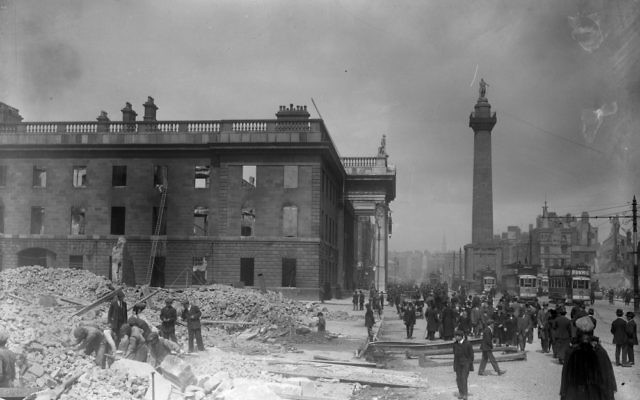The Man Who Missed Ireland’s Easter Rising

By Tom Keating
While Jews around the world are celebrating the Exodus more than 3,000 years ago at Passover, Jews with a connection to Ireland also have their minds on a fight for freedom 100 years ago.
The uprising that began in Dublin on Easter Monday, April 24, 1916, failed to expel the British from Ireland, but the revolutionary fervor it unleashed and the leadership it forged led to Ireland’s partial freedom a few years later.
The crucial events are still shrouded in the mists and myths of history, revisionism, contradictions and archival documents even as Ireland commemorates the Easter Rising with a centennial series of moments, speeches, wreath-laying, and ceremonies.

One person who may not receive the examination he deserves for what happened at Dublin Castle, the center of British rule in Ireland, is the Jewish undersecretary for Ireland, Sir Matthew Nathan.
Since the outbreak of World War I in August 1914, the 52-year-old careerist Nathan had been the No. 2 person in charge of Irish affairs under the Home Rule Act of that same year.
But that fateful Monday after Easter 1916, with his boss in London, Nathan was the main man, the head diplomat-soldier. Facing contradictory information about the size, location and timing of an insurrection by disparate Irish groups, he failed to put together the intelligence pieces, including the seizure of a shipment of secondhand arms from the Germans, but instead concluded there was “no indication of a rising.”
Until that point in his military-foreign affairs career, Nathan had exemplified a type of rise through the ranks of the British Empire amid numerous postings.
In March 1899, Queen Victoria appointed Nathan, then a major, to temporarily administer Sierra Leone. Eighteen months later, he was named governor of the Gold Coast — the first time Victoria appointed a Jew to a colonial governorship.
A series of commissions as a citizen of the empire gave him experience in Hong Kong and Natal, secretarial positions in England, a knighthood, and recognition that he was a top-rate administrator, especially hardworking, an effective public servant and a bachelor with appropriate social tastes.
The writer Leon O’Broin detailed his appearance as “upright, square-shouldered, powerfully built with a finely shaped head and strong jaw while his blue-grey eyes and his resonant voice revealed a forceful pleasant personality.”
A thorough look at Jews in England during the first third of the 20th century in the 2008 dissertation by Stephanie Chasin characterized him as the epitome of political life in, and loyalty to, the British Empire. He was Jewish, English and British. Perhaps his motto, “Never ask, never refuse,” best explained his career rise.
It also seems that the continuously conflicting Irish situation produced too much weight, so he practiced the stance of “lay low, do nothing” until the rising was upon him.
Maybe he had not been at the ready while his superior, Chief Secretary Augustine Birrell, the top political officer for Ireland, was in London that spring fortnight.
Perhaps Dublin Castle was too relaxed, and for sure understaffed, during the national bank holiday. The mood of many was more about picnicking or enjoying the Fairyhouse horse races.

The British administration was certainly not prepared to repel a sustained attack. But most of Ireland, including most of the Irish Volunteers, the main force staging the uprising, did not rally to the rebels, who surrendered by Saturday, April 29, after the British poured in fresh troops from across the Irish Sea and pounded Dublin with heavy artillery.
Almost 500 people, more than half of them civilians, died in the six-day uprising, and more than 2,600 others were wounded.
Whatever prevented Nathan from making the right call, both he and Birrell were required to make the right loyalty statement, and they resigned by Thursday of that fateful week.
Nathan became known as “Nathan the Unwise” to many.
The subsequent Royal Commission headed by Lord Harding found: “Sir Matthew Nathan … carried out with the utmost loyalty the policy of the Government … but that we consider that he did not sufficiently impress upon the Chief Secretary … the necessity for more active measures.”
Nathan did get to continue his career in Queensland, Australia, as governor. He later wrote a substantive book on the property background of generations in West Coker, England. After his death April 18, 1939, he was buried in the Jewish cemetery in Willesden, London.
While history has brought troves of material on the rising, new insights on Nathan’s relation to Judaism and the influence of his Jewish background on his career, specifically this nadir moment, are still forthcoming.
Suffice it to say, my personal interest in some things Irish-Jewish, even English-Jewish about Easter Monday 1916, will continue.
Educator Tom Keating is a member of The Temple and an Irish citizen.



comments